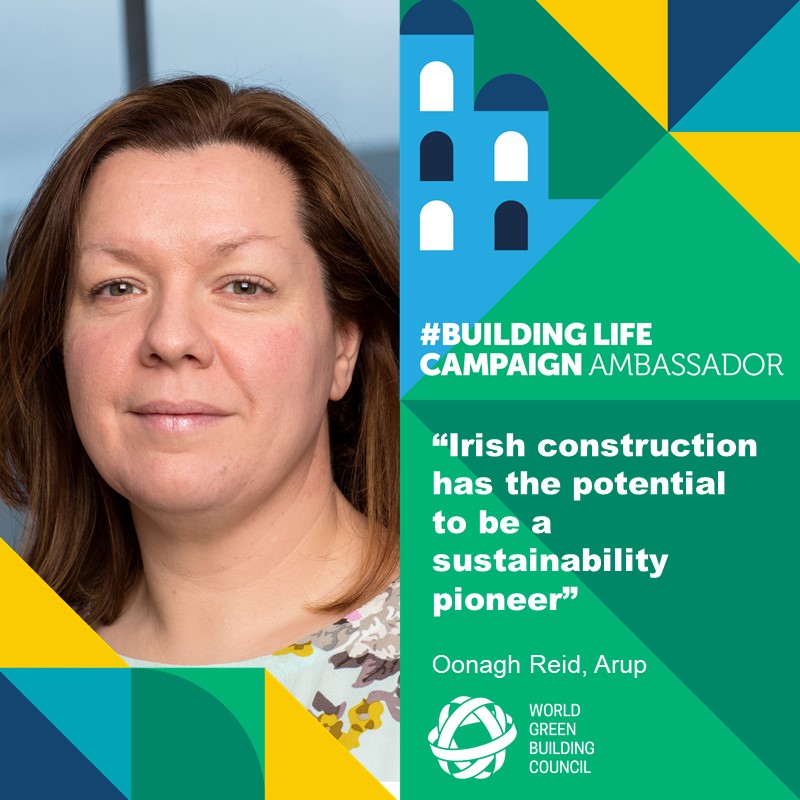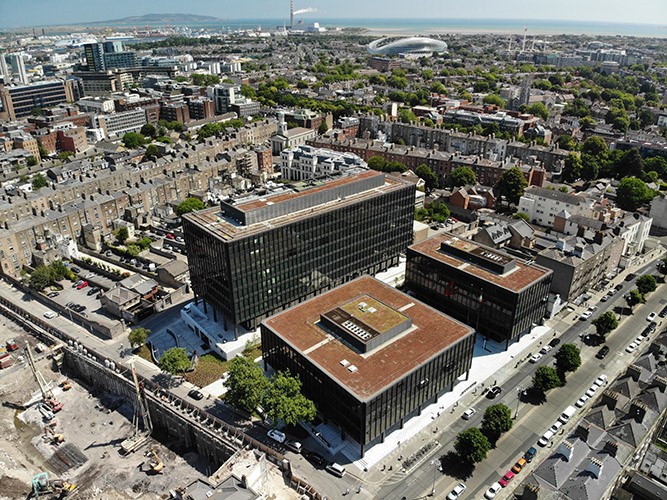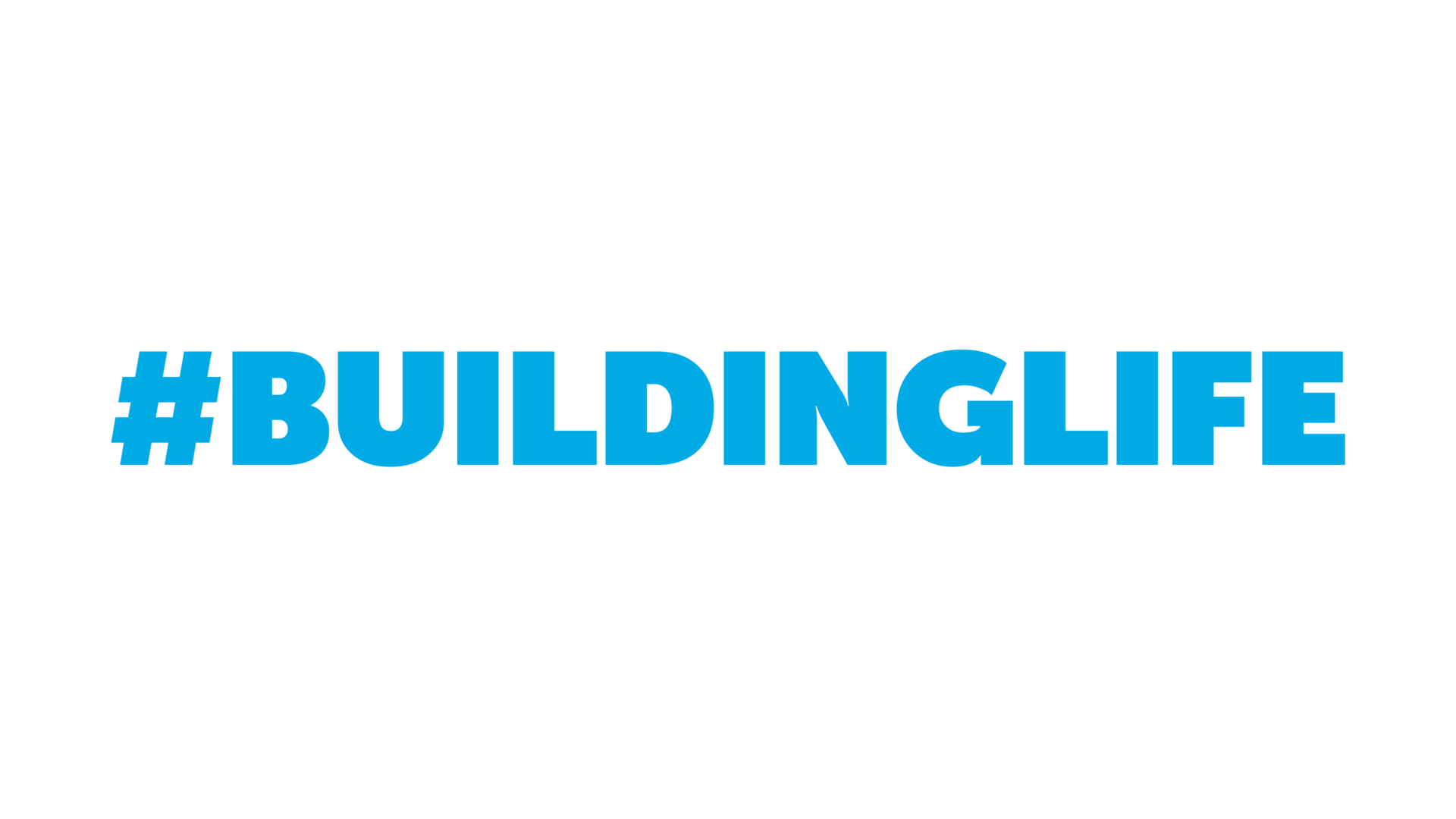
Arup director and #BuildingLife ambassador OONAGH REID speaks with Robbie Cousins, Irish Construction News, about the challenges and opportunities she believes the Irish construction sector is facing in helping Ireland meet carbon emission reduction goals up to 2030 and beyond.
The Irish Green Building Council’s (IGBC’s) #BuildingLife campaign aims to achieve a broad range of private sector actions and public policy changes that will be required to tackle the whole-life environmental impact of buildings.
An integral part of the campaign is the appointment of #BuildingLife ambassadors. The role of these ambassadors is to champion #BuildingLife goals and help drive change around sustainability across the construction industry.
Speaking about her role as an IGBC #BuildingLife ambassador, Oonagh Reid says that one of the most appealing parts of being involved in the campaign is that it brings together diverse representatives from across the entire sector to find science-based and industry-backed solutions, such as the national decarbonisation roadmap for the built environment currently being produced.
“For Arup and for me personally, we are delighted to be part of this great opportunity to drive change in our industry and at national and European policy levels,” Reid comments. “The initial goal is to shift from the predominant focus on operational energy usage to addressing the total environmental impact of the construction process. It is a very exciting campaign to be a part of.”
Achieving cross-sector buy-in
Reid says that there has already been a substantial change within the sector around the awareness of the importance of looking at the whole lifecycle carbon impact of construction projects.
“It’s great to see ambitious targets for the reduction of operational energy being adopted and embraced by the sector. But perhaps even more exciting and challenging is to begin to add a new lens of embodied or whole life-cycle carbon to the design and delivery process.
As an industry, we need to lead by example in pushing this – it needs complete cross-sector buy-in.”
As a company, Arup is taking steps to reduce carbon emissions in its own operations as well as through project work. Following a commitment in 2020 to achieve net-zero emissions across its entire operations by 2030, last year at COP26, Arup built on this by committing that from April of this year, it would begin to undertake high-level whole lifecycle carbon assessments globally for all of its building projects, both new and retrofit.
“We have been working hard to get a system in place that will allow us to gather data to an appropriate scale and useful levels of granularity. Then, we will be able to draw conclusions from the assessments in a standardised way. We hope that the insights gained from this will become an invaluable resource in helping clients to lower the carbon impact of their buildings, as well as furthering the industry’s understanding of carbon impacts on particular design decisions.”
Environmental Product Declarations
Environmental product declarations (EPDs) are a standardised way of providing data about the environmental impacts of a product through its lifecycle. In Europe, they must conform to the European Standard, EN 15804, which ensures that EPDs for construction products use a common methodology, report a common set of environmental indicators and have a common reporting format. This means that EPDs can be integrated into building level assessments and used to compare construction products in a building context.
Oonagh Reid stresses the importance of having this information if the construction sector is to tackle its total environmental impacts.
“The adoption of EPDs is a positive step forward for sustainability in the sector,” she explains. “Having a standardised way of providing data about the environmental impacts of construction products and the product lifecycle is important. We, as designers, are limited in the informed decisions we can take on the products we specify without this information.”
But she says that the current lack of embodied carbon data from many manufacturers is a fundamental barrier to being able to conduct accurate analysis. “Manufacturers providing transparent environmental information on products and materials used in our projects is a key step.”
Retrofit challenge

Reid comments that it is reported that about 80% of the predicted building stock for 2050 already exists, so there is a significant challenge for the sector in terms of retrofitting, particularly in older building stock.
“There needs to be a greater emphasis on recognising the embedded value of our existing buildings. It is an area that must be made more attractive for investment. There can be challenges around refurbishing existing building stock in terms of physical constraints and compliance issues. But bring this challenge on. The onus is on us as professionals to work collectively to come up with innovative and exciting ways to reuse and enhance our existing building stock.”
Sharing one example of re-using as much of the existing buildings as possible, she mentions the Miesian Plaza office complex retrofit, which involved the redevelopment of the former Bank of Ireland headquarters on Baggot Street in Dublin.
“The protected fa ades were sensitively refurbished, and the existing mechanical and electrical infrastructure was replaced entirely to create three stand-alone buildings.
“Achieving high standards in energy efficiency was a priority for the restoration of Miesian Plaza, in line with the ambitious sustainability targets set by our client, Remley Unlimited Company. The performance of the complex was successfully upgraded whilst maintaining the existing materials and fabric in place, wherever possible, and 75% of waste and demolition from the works was recycled and diverted from landfill or incineration.” In 2019, Miesian Plaza was the first development in Ireland to be certified LEED Platinum v4, the highest available sustainability rating.
Sustainability opportunities
Oonagh Reid explains that since 2016, Arup has been a knowledge partner of the Ellen MacArthur Foundation (EMF), a charity that focuses on accelerating the global transition to a circular economy. Arup is working with EMF to reshape built environment practices to design out waste and pollution, keep assets in use for longer and regenerate natural systems.
Reid says that early project team and supply chain involvement is needed if the sector’s carbon footprint is to be reduced.
“Greater connectivity between the full project team from concept through to procurement could support projects in meeting their carbon reduction goals,” she explains. “Modularisation and offsite construction are becoming more common, and contractors have started to look at the equipment they are using on site, introducing low carbon alternatives such as the electrification of their heavy equipment. If we take this a step further, the carbon footprint of projects can be greatly reduced if the project team and supply chain work together from the earliest stage to find sustainable solutions. Designers, contractors, manufacturers and clients all working together will result in better environmental solutions in terms of materials and processes.
“Projects must use fewer resources and materials for the building’s functionality and performance to be optimised. In addition, the recycling or reuse of materials at the end of a building’s lifecycle should be maximised. This thinking should be at the forefront of all of our design work.”
She adds that while sustainability has changed building design, it does not impede designers from being aesthetically creative. “Collectively, we are not doing the job right if the design takes away from the aesthetic.”
Technological advances
“When I started my career, modular construction was unheard of,” Reid comments. Now, robotics are increasing productivity and reducing waste. The use of BIM models and VR to view buildings during the design phase can identify areas for greater spatial efficiency. Digital twins can be used to assess energy performance in an ongoing manner. All of these tools can help us reduce waste and optimise the performance of buildings.”
A better world
In closing, Oonagh Reid reiterates that greater cross-sector collaboration is needed for the #BuildingLife roadmap to succeed. “There’s great momentum behind the sustainability movement at the moment, not just within the sector but across society. The roadmap and the use of EPDs will effect change, but the whole industry needs to work together and push this. We need to start looking at projects through that whole life-cycle carbon sustainability lens, designing with decommissioning and reuse in mind. And with all parties working towards a common goal, perhaps the construction industry and the built environment could emerge as a sustainability pioneer. “Ultimately, all of this is about leaving a better world for our children. I am delighted to be able to say that this is part of my job now, and I am very excited about what we will achieve,” Oonagh Reid concludes.
For further information about EPDs, visit www.epdireland.org
This article was first published in Irish Construction News February March 2022 issue and on www.constructionnews.ie
#BuildingLife is a project led in Ireland by the Irish Green Building Council. The initiative aims to achieve the mix of privasector action and public policy necessary to tackle the whole-life impact of buildings. Learn more here.

